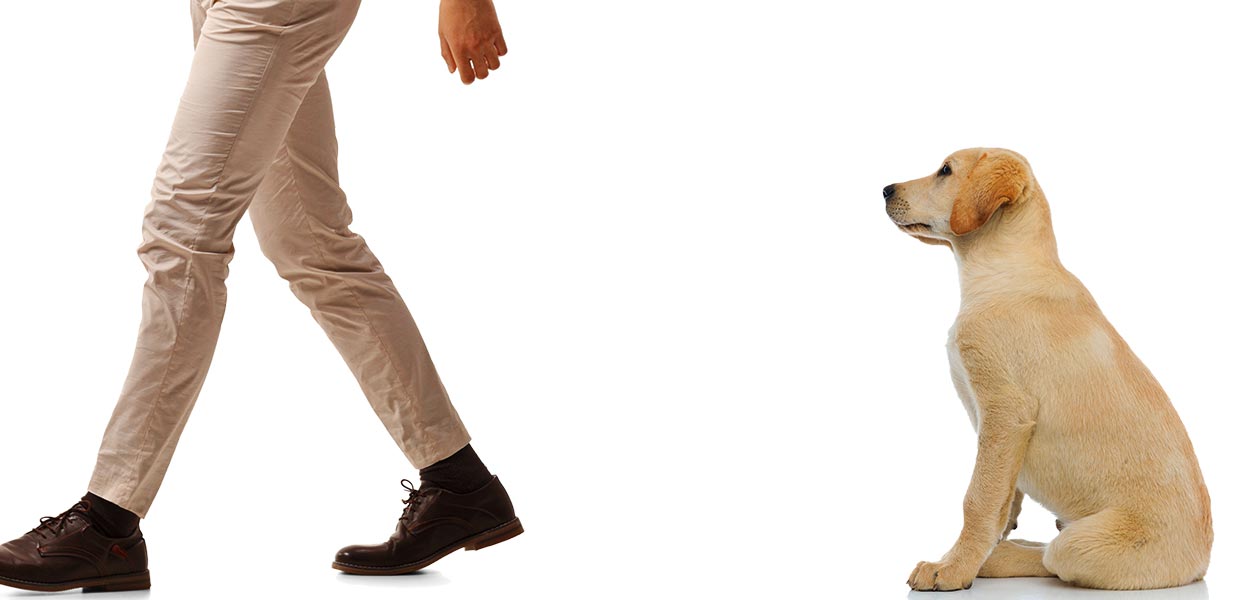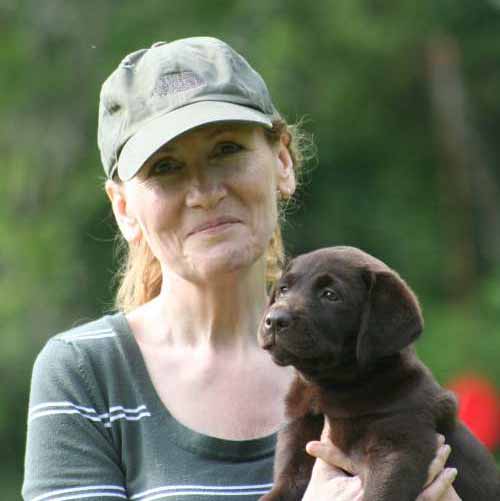 Raising a puppy when you work full time can be done. But you’ll need a structured day, and some help.
Raising a puppy when you work full time can be done. But you’ll need a structured day, and some help.
Potty training, socialization and avoiding separation anxiety, will be three of your top priorities as a working puppy parent.
Don’t forget to pop your email in the box below if you’d like to receive our free training tips – they will help you get off to a great start with your puppy.
Although it won’t always be easy, raising a puppy when you work full time is not an impossible dream.
With the right planning, your new dog can still grow into a happy, healthy member of the family.
Can you have a puppy when you work full time?
There is no law preventing a working person from buying a puppy.
But some breeders will be unwilling to home one of their dogs to someone that isn’t around for much of the day.
This is because tiny puppies require a great deal of interaction, time and care when they are small.
Regular toilet visits and meals are a must when they are little.
Breeders also don’t want to think the dogs they have raised will be neglected when they are adults either.
Left alone from 9 til 5 while their human family is out.
But just because someone works full time, doesn’t mean they can’t give a great home to a dog of any age.
You just need to have the right structures in place.
Options for raising a puppy when you work full time
You have three main options for raising a puppy when you work full time.
Which one you choose will depend upon your circumstances, and the size of your wallet!
Broadly speaking your choices are:
- Working from home
- Doggy daycare
- A dog sitter/ helpful friend
Working from home
Although in the past a bit of an impossible dream, for many people these days working from home is a given.
It isn’t always ideal, but if your workplace is amenable and your scheduling is good, then combining a home based job and a puppy can be wonderful.
You will lose some time during your day to puppy care, but because you are right there with them this shouldn’t be excessive.
Most at home jobs are able to be worked around this commitment, provided you don’t need to be in live video calls for much of the time!
You can get lots of help with puppy rearing in our online puppy parenting course here.
Although the advice we give in the course applies to all puppy parents, this should all be easiest to follow if you are in close contact with your puppy.
But not everyone can work from home.
And the difficulties with raising a puppy when you work full time really arise when you need to be out of the house for more than an hour or two on a regular basis.
Doggy daycare
Probably the most expensive solution is doggy daycare.
These are establishments that you drop your dog off with the care center in the morning, and collect the dog from them in the afternoon.
Most doggy day care centers won’t take puppies under 3 months old.
And you’ll need to pick your daycare center carefully at this young age.
Too much free play with other dogs and your pup could easily become quite rowdy with them in future.
Not to mention overstimulated and overwhelmed.
It’s also likely that these hours will not be focussed on potty training.
So you’ll need to give every ounce of your attention to that when your pup is at home.
Leaving A Puppy Alone
The practicalities of doggy daycare for most puppy parents mean that this option is not ideal. At least until their dog is older.
But you can’t simply leave your puppy in a room or in his crate while you are out for the entire day.
Isolating a puppy or young dog can cause all kinds of problems, including separation anxiety, soiling, and constant barking. And it is likely to be extremely stressful to a young puppy.
So, you will need help. That’s where dog sitters, and dog walkers come in.
How long can a puppy be left alone during the day?
Puppies need companionship, and an awful lot of bathroom breaks.
They also need feeding much more regularly than older dogs, as their tiny tummies can only cope with small portions.
This means that they can’t be left alone for very long at all when they are young.
However, the amount of time does increase as they grow.
How long can you leave an 8-10 week old puppy alone?
For the first week or two that your puppy is home, you should aim to be around all the time.
You will probably even want to settle them in your room at night for much of the first week.
Being taken away from everything they know is scary for puppies, and they are sometimes very upset.
If possible take the first two weeks, 8 to 10 weeks old, off work. Even if you work from home!
Potty training at this point requires going outside very frequently. Maybe every 15 minutes or so for parts of the day.
And socialization is time consuming too.
Your puppy needs to meet new people and visit new places on a daily basis too.
You will also need to use these two weeks to start crate training your puppy, to gradually get them used to being shut in for short periods of time.
Carefully done, this process will help the puppy see their crate as a wonderful, relaxing den to snuggle down in.
How long can you leave a 10 – 12 week old puppy alone?
Those two weeks make a difference to a puppy’s bladder control, but you’d still expect a pee break every 2 hours if not less.
If you crate train your puppy you don’t want them left crated for any longer than this.
Someone will need to visit the house every 2 hours to let them out for a pee, and to have a play.
They will need to stay with the puppy for at least half an hour, interacting and having fun.
And they won’t be able to leave until the pup has peed, which the puppy must do before they go back in their crate.
If you can’t get someone in this regularly you’ll need to set up a large puppy play pen.
Put puppy pads at one end, and their open crate at the other for when they’re tired.
Even with this set up, don’t leave your pup for any more than four hours without a visitor.
How long can you leave a 3 – 6 month old puppy alone?
A three month old puppy may be able to hold their bladder for up to three hours.
They might even happily snooze in their crate during this time.
Make sure they are let out for a pee, a play and some human interaction after no more than three hours.
Puppy proof room
Although crates are fine for short periods, it’s important not to keep your puppy contained all day.
If you need to go out to work, then a puppy pen set up or a puppy proof room are important.
A puppy proof room will have a wipe clean floor, and there will be nothing in the room that the pup can damage. The room should also be free from hazards.
Cables, furniture, these are all appealing to a dog that is bored and on its own.
Toys can help, if they are sturdy and in good condition. Check regularly for loose bit to make sure they don’t represent a choking hazard.
We recommend a stuffed frozen Kong to keep a pup occupied for a while.
Puppy potty training vs full time work
In an ideal world, you would be home with your puppy to establish potty training following a clearly laid out routine and schedule.
But not everyone’s life allows for this.
Although using puppy pads when you are out can delay house training, it doesn’t make it impossible.
Start by covering most of the floor that the puppy has access to with puppy pads.
Over time you can decrease this area until they are only going in one spot.
When you are home, take the pads up temporarily and give your full attention to potty training.
Dog sitters or dog walkers
Using a dog sitter or walker to come and let your puppy out for a pee and play can work well.
But there is obviously a cost involved.
Many puppy owners ask a friend or neighbor for help, but do approach this with caution.
Some people quickly lose enthusiasm for a task or become resentful.
Or have certain expectations of you in return.
If at all possible do consider paying a professional for help, rather than relying on favors that could backfire in the future!
Raising a puppy when you work full time: summary
Raising a puppy when you work full time is not an impossible dream. It’s totally achievable.
But you must have a great plan in place before your puppy arrives home. You cannot just buy a puppy and leave it ‘home alone’ without storing up problems for the future.
Get help, make commitments and make backups to those commitments too. Just in case you get delayed at work.
Make sure you stick by your dog when you are home and give their training your full attention.
If you do this right, you can still have a great bond with a dog, even if you work full time.

Free Training Tips
Get Pippa's free dog training tips delivered to your inbox

 European German Shepherd Dog
European German Shepherd Dog
I really appreciate the part of your article that states that taking care of a puppy is much easier when working from home. My sister finally managed to snag a home-based writing job, and this has allowed her to relax a lot more often. However, it gets pretty lonely at home, so she’s been thinking of getting a pet. Now that I know that leaving the dog alone won’t be an issue for her, I’ll definitely help her look for any canine puppy sellers in the area where she can buy her first furry friend.